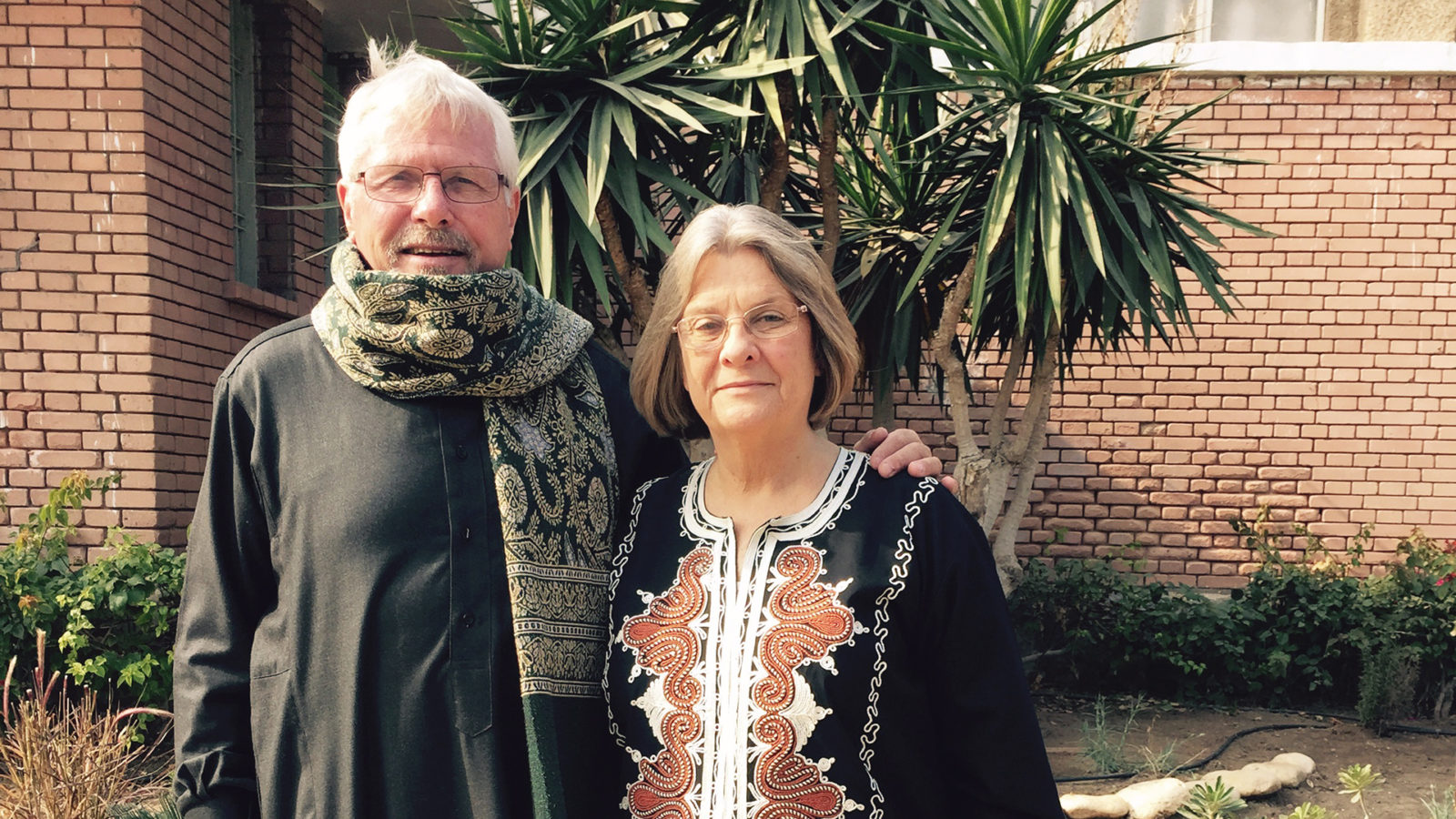Name: Clif and Karen Maberly
Job: Vice principal/head teacher
Where: Nile Union Academy, Egypt
Where do you work?
Nile Union Academy is the premier Adventist high school in Egypt—maybe in the Middle East. It has only 120 students but remember that its constituency church has only around 400 active members.
Our students are children of Adventist families—Adventist Egyptians and Adventist Sudanese “refugee” residents of Egypt. The rest are children of relatives and friends of Adventists—with the Egyptians being mainly Orthodox (Coptic) and the Sudanese mainly Evangelical or Catholic. For us they are all brands plucked from the burning—youth who would not have the opportunity to get international education or long exposure to Adventists if they didn’t come to our school. Quite a few become believers, some go on to Adventist higher education overseas and become Adventists there.
What is your role and how long have you held it?
Karen’s role is head of English language and recently head teacher. She has been teaching cross-culturally most of her life, from grade one to university level—here for four years.
I came as “retired” professor turned “trailing” spouse—Karen had the GC call. I’ve gradually assumed all the jobs the principal doesn’t have time or inclination to handle—so became vice principal. I focus mainly on campus life, dormitories, government and community liaison, and major projects.
What does a typical day look like for you?
Karen’s typical day may be familiar to many teachers—up early to prepare yourself, and your lessons and tests for the day. Begin the day with a Year 12 class in reading and writing, followed by an ESL (English as a second language) class in the same. They couldn’t be more different—one is almost college level; the other includes students who are illiterate even in their mother language. However in 4-5 years they will be ready for university. The teaching has to be skilled and effective.
Following a class break Karen then teaches ESL listening and speaking—some of the same students, but a different skill set. These ESL classes need a good textbook and significant teaching aids. But more than that they need assurance they are doing OK. Nothing is more humiliating than being immersed in a language you don’t understand, taught by a foreigner who couldn’t understand anything you want to say to them! Unsurprisingly, ESL needs a lot of compassion and assurance.
The rest of the day is filled with training and advising the batch of inexperienced English-teaching volunteers—some inexperienced at teaching anything, let alone teaching in the language that is the content of the class. Sometimes they are hardly-English-speaking teachers from Brazil, Colombia, Peru, Mexico and elsewhere. Of course the only teachers without any accent are the Australians and New Zealanders 🙂
And then the administrative duties of a head teacher: advisor to the principal and an administrative council member.
Maybe braving Cairo traffic—avoiding donkey and horse carts, child-driven tuk tuks and aggressive microbuses. Potholes and sump-tearing speedbumps may add a different twist to going shopping. A little catchup on Facebook, chatting or FaceTime with our children and grandson bring the end of another 16-hour day for Karen.

On the other hand, my typical day is never typical. I point my sorry self in the right direction around 8 in the morning, having kept Egyptian hours the night before. I might teach the English grammar that Karen avoids at 10, followed by an English language exam preparation class, and then my day turns to vice principal duties. It might begin with a chat with the principal on student discipline matters or on inter-staff issues. It may proceed to sitting under the giant ficus tree doing quality control with the contractor of the day, or arguing aesthetic values with the architect of the next project, or drinking tea with sub-contractors, suppliers and just acquaintances (anise or hibiscus tea is a healthier substitute, although you still have to beg off on the hospitable 3-4 teaspoons of sugar).
I liaise with government officials and their minders. I locate needed services and products. At the moment, it is the summer work program for students who owe money to the school—so I meet with them at 5:30am, work beside them until 9, get their breakfast by 9:30, worship with them and refocus them before 10, then leave them to complete their tasks by 2pm. Later I will need to keep some track of them until they collapse into bed around 9. Then it’s off to make business and social calls in the community until 11 or 12.
All workers, contractors and sub-contractors deserve a social call—especially night guards at 2am for a “night picnic” in their shack beside the school wall, or their loyalty and diligence may become perfunctory. If danger comes over the wall they put themselves at risk protecting us. The world here turns with relationships not contracts.
What is your favourite experience in this role?
For Karen it is seeing her students gain skills and confidence. They know she likes them, and is working to help them. She knows what they need.

The cream on the cake for me is friendships with community leaders. I undertook most of the Ramadan fast last year (17 hours without even water), and was invited to “breakfasts” everywhere, knowing I was really breaking my fast with them. It is a highlight for me to spend a part of the evening with a top businessman in his home, sit with the “60s club” of village “problem solvers” in a circle of chairs in the middle of a dusty lane late at night, or watch a rigorous game of dominoes outside an Arab home at midnight. I do feel good about being recognised as I walk or ride through the surrounding communities—called out to by name (“Abdullah” here) from shops, balconies and passing vehicles.
What would you tell someone who was interested in doing what you do?
It is such a privilege to know another people, and to know people you never would have known otherwise. If you come to educate, you can make a palpable difference in the life of wonderful young people, struggling to become educated.
It is also a great opportunity to get out of your comfort zone—and into another. For me, I had spent my life with Buddhists and then found myself in the middle of this Egyptian and Arab and definitely Muslim community. All my previous opinions were biases. Now I know what it is to be a Muslim—a sincere, nominal or insincere Muslim. It is great to find God is already here, and find the privilege of the clearer revelation of Him we have been granted.
What are some of the rewards?
The reward is to know yourself and your own faith better—by comparison and through desperation. Then there is the opportunity to find ways to share your insights with those others—the ones you now know. You can know more confidently that the revelation you have stumbled across tells of a more compassionate God and offers much sounder teachings for life.
How do you most experience God in this role?
It is an opportunity to know and love God more appreciatively and specifically; and to broaden the circle of neighbours to love (almost) as yourself and your kind.
Anything else you’d like to say?
Karen and I are winding up 40 years of mission service next year, the last five in Egypt. However, that leaves our school, Nile Union Academy, without a vice principal and head teacher for a school year before they get a regular replacement. We really need a locum—someone to step into our shoes (and house) for nine months—from early August to June next year.
You don’t need all of our skills, but the position would be ideal for a couple interested in taking a year out, or wanting a year back in, in an amazing part of the world. The school has a number of significant breaks throughout the year—so there is a chance to explore and experience the world outside.
Dates are early-August 2018 to mid-June 2019.







